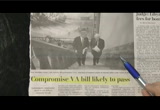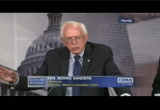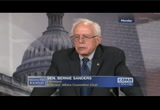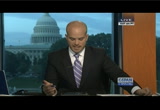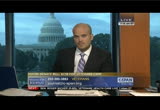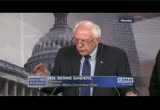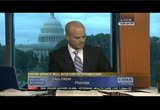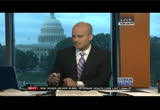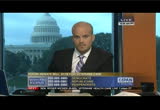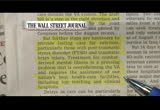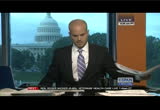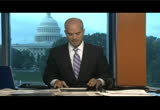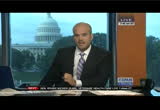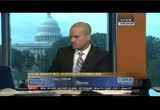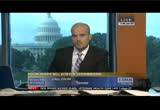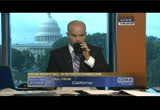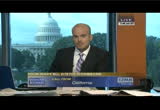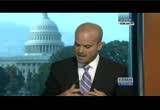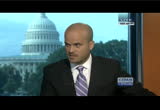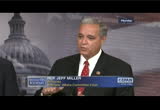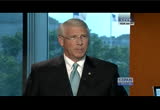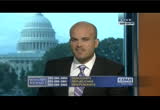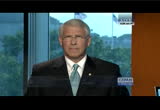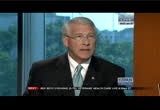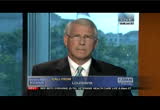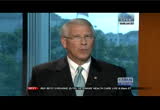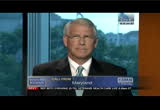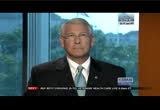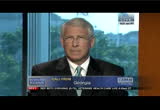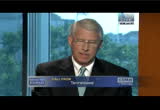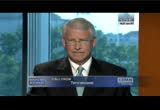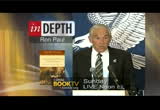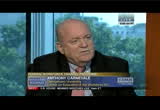tv Washington Journal CSPAN July 29, 2014 7:00am-10:01am EDT
7:00 am
someone from georgetown university will discuss the aral workforce training programs. you can join the conversation on facebook and twitter. ♪ good morning. it is tuesday, july 29. the housemates at 10:00 a.m. today with afternoon votes expected in the senate. meets at 10:00 a.m. today. the confirmation of robert mcdonald. key lawmakers in both chambers unveiled a $17 billion plan to repair by -- to provide emergency support for veterans. this morning, we break down the deal. we're asking our viewers for their thoughts on that
7:01 am
compromise. is it enough? are you concerned about the price tag and has congress reacted fast enough to the? democrats can call (202) 585-3880. republicans can call (202) 585-3881. independence, (202) 585-3882. a special line for veterans, (202) 585-3883. you can catch up with us on facebook, twitter or e-mail us. a you're good tuesday morning to h you. here is usa today story. congress moves to boost v.a. a bill to reform ba will move to vote --ca will move to
7:02 am
v.a. will move to vote. had sought more to fix the problems. the washington post compromise likely to pass. a picture of the two chairmen of the house and senate veterans affairs committee's. bernie sanders on the right and jeff miller on the left. those two men appearing at a joint press conference yesterday to talk about this compromise deal that is in place. here is senator bernie describing what the deal includes. [video clip] sufficient sums of money must be provided so the ba has the resources to immedia -- this bil does that by contracting out with private medical providers, community health centers, the
7:03 am
department of defense facilities. this is something that was contained in the house bill and we've accepted that language. this agreement consistent with the bill allows veterans who live 40 miles or more from a v.a. facility or more to get their health care outside of the v.a. you should not have to make the long trip. you should be able to go to a provider in your community. this bill, in terms of dollars, provide some $10 billion for contracting out of health care and for those veterans who live 40 miles or more away. secretary -- the madeg v.a. secretary has it clear that we need to make sure they have the doctors they .eed $5 billion for them to strengthen their capabilities. this legislation consistent with bills passed in the house
7:04 am
unanimously authorizes funding to lease 27 major facilities that will cost $8.5 billion. theave all been outraged by distortion of data and so forth. this bill contains language which will allow the secretary to fire people immediately who were doing -- who are underperforming. period ofhem a 21 day appeal without pay. host: helping explain how the deal came together. shane. to leo he was at that press conference yesterday. good morning to you. caller: good morning to you. host: how much of this deal was a compromise between what sander sanders wants and what senator
7:05 am
congressman miller wanted? this is really a compromise -- da wanted $18 billion for long-range plans -- v.a. wanted $18 billion for long-range plans. chairman miller and a number of members of the house said they don't have the information they need yet on exactly how that money would be spent and where it would go. this final deal has a bit of everything. what the v.a. wants in getting the medical leases. $10 billion for expansion of the private care options. policiesountability for be measured. the ability to fire senior executives it will easier and give them an appeal period.
7:06 am
if they are underperforming, get them out. host: where is this $17 billion coming from? how much of that money will be paid for? caller: $5 billion will be offset. the other $12 billion is going to be emergency funding. that will be a bit of a sticking point for some conservatives in the house. , houseas been concern members have wanted to make sure this does not add to the deficit. emergency. he felt this was a good compromise between the two. making sure there are some upsets, but setting aside $12 billion that will immediately chambers.a. -- as both
7:07 am
go through the normal appropriations process next year, more money will be paid for. show our viewers some tweets from members of the senate veterans affairs committee in response to the steel. this deal.nse to from jerry moran -- patty murray -- two the tweets that came out yesterday. how much push back have you seen on the deal? very little at this point. we are expecting it to pass ready easily in both chambers. there are a few conservatives in the house who will be concerned with this adding to the deficit.
7:08 am
most folks happen focused on getting something done with the v.a. to get a veterans bill finished. on thursday, and look like this was very much impossible. -- it looked like this was very much impossible. they said their staff have been talking. by thursday, they had some press conferences and public fighting over how to proceed. the fact that they reached a deal over the weekend was good news for a lot of lawmakers were anxious to go home with something. deal, a v.a. reform something that will help veterans down the line is something they will be touting when they get back to their districts. mentioned, robert mcdonald facing a confirmation vote today in the senate.
7:09 am
talk about the questions he faced in confirmation hearings and whether this will be a tough book for him. -- tough vote for him. calmr: it was a pretty hearing. were moree senators attacking v.a. and pointing out v.a. problems, not so much looking at mcdonald's record. he doesn't have any health background. he is bringing in 33 years of business experience. of the senators are very excited about that. the bureaucracy has gone awry and somebody needs to come in and simplify things. he is the one for the job. we are not expecting any real opposition.
7:10 am
the work for him begins after the confirmation. that vote taking place at 2:45 this afternoon. it leo shane is with military times. thanks for joining us this morning. caller: thank you. host: we are taking your calls and comments. your reaction to the $17 billion for veterans care. let's start with columbus, ohio. independent and veteran. good morning to you. caller: thank you for taking my call. i am so disgusted with these congressmen. they don't want to give the veterans -- i think the creator i came back in one piece. get someian lamb would descendent of the butler family -- i donatee book
7:11 am
to the paralyzed veterans and i feel sorry for those guys who came back with the loss of a limb. this stupid iraq war, brain injuries, ied -- people don't know what war is. general sherman was right when he said that war is hell. get the descendent of the butler family on to talk about that book. "war is a racket." for: lee is on airlines veterans -- our line for veterans. calling from sterling, virginia. in morning. -- good morning. -- the factbillion
7:12 am
it took this time to get this deal is ridiculous. it should have been a no-brainer. -- iing to the point that question if the $17 billion is enough. i know the congress has touted that they have given the v.a. more funding, record funding highs, but you look proportionally at the amount of ,eterans that have been injured complex trauma type injuries and illnesses, i would question if that funding level is correct. frankly, i think it's a leadership issue. was it under because of pressure that leaders did not provide for the right into? hear, whatted to what the -- we know
7:13 am
money will do. tourniquet to stop the bleeding. hope bob mcdonnell -- bob does have health care experience. it's a large health care business line. i think he does bring that into the mix. will he be given the latitude to make the business type of changes he needs? you think this is something congress should have
7:14 am
done months ago? are you concerned about what's happened to veterans and the time it's taken to make the steel? -- this deal? caller: absolutely. it's a politically driven situation. tocourse, congress is going stop the bleeding. they will provide coming up on an election. people -- ithere's will be interesting to see the research of what it will take to provide veterans that care and support they need. i think that is something that is not really spoken. the army just announced they are going to be giving 70,000 soldiers a pink slip. who is going to be taking care of those soldiers?
7:15 am
making sure these veterans are coming back alive -- these veterans are reserve and guard. they will make sure to keep us out of harms way in the future. if we don't rehabilitate these reserving guard, many of these are the ones who will go back to war when the time comes. one of his concerns about the timing of this deal. how long it took to come together. here is a bit from congressman jeff miller, the chairman of the house veterans affairs committee. [video clip] >> we have been working on this diligently since the days that this past both bodies. the fact that there had been little action or movement or a long amount of time was exaggerated. haveor sanders and i worked very diligently to try to beforehis into closure
7:16 am
we left for august recess. that has always been the deadline that we had set to be able to get this bill passed by both houses before we went home. host: at that press conference yesterday, the $17 billion in emergency mandatory spending was announced. it would include $10 billion to allow vets to get care from private providers. $5 billion to upgrade facilities, higher staff. staff. we want to get your thoughts this morning on that deal that came together that was announced yesterday. janice from colorado on our line for independents. good morning. caller: good morning. i am calling from the southeast corner of colorado. that part in kansas. we are very far from a facility. my husband is a vietnam vet.
7:17 am
i have a couple of comments and questions. doctorsbeen told by that it was not their fault that we chose to live so far from take care that could of specialist things. we are 20 miles from a satellite clinic. we are a good 4-5 hours away all thever where specialty clinics are done. toonder if the v.a. wanted show us to denver. veterans who live 40 miles away, does that include -- we are 20 miles away from a satellite clinic we can get to.
7:18 am
does that also included the specialty clinics? a fee-basedo see octor and had a really good outcome. worked out really well for us because it was just a few hours. footnote -- il don't know how many people this would entail -- our daughter passed away four years ago and we are now caretakers of a pitbull mix. denver has a ban on pitbulls. we can go there and leave her here for the 17 hours it takes to go and wait in line. sometimes you get up there and you find out your specialty clinic has been canceled. i hope they do get this fixed. it is very frustrating and i know we are not the only ones
7:19 am
who have experienced some of these things. host: janice in colorado. the details of the bill continuing to come out. just before midnight, the house posted the text of that bill. news.ccording to fox it could be up for a floor vote on wednesday in the house. that posted just this morning. let's go to billy in colorado on our line for democrats. good morning. the track record was very mediocre. he was basic at best. to give you an idea -- he turned in a budget proposal a couple of days ago for $18 billion. his credibility is about a mile wide and an inch deep.
7:20 am
one of the problems we're running into, dr., coburn came sayingh a report thousands of vets will have died in the last 10 years because of v.a. health care -- dr. tom coburn. on this new bill, you can fire the executives, but you can't fire the idiot people, the lower-level staff. that's over 50% of the problem. nothing is going to change because you can't get rid of the deadwood. when a guy turns in an $18 --lion budget on three pages i respect him as a veteran. he has a real mediocre career going on. host: what do you think of robert mcdonald his confirmation vote is happening later today? people,you can't fire
7:21 am
nothing is going to change. look at our educational system. we are number 30th of the world. we can't fire folks. people had the inclusion to pull off all the stuff. nothing is really going to change because you can't fire these lower-level people and they are over 50% the problem in my opinion. our: carol writes in on twitter page on the subject of firing officials at the v.a. -- you can follow along, the conversation on twitter. a little bit more from the press conference yesterday. bernie sanders and congressman miller discussing the culture inside the v.a. and what the new leadership could do about it. [video clip]
7:22 am
next two within the weeks that bob mcdonald will be voted up on as the new secretary. i have a lot of confidence. there. a new team in i hope they fully understand that some of what we have seen and heard about in the last few months is not a political issue. if this is unacceptable for member.d any there is not going to be lying about wait lists. there will be a relationship between congress and the v.a. there will be information provided to us. belief that women veterans get in through the v.a. system, they feel pretty good about the quality of care they are getting.
7:23 am
veterans get in. will have the. doctors, nurses and culture to make sure that every eligible veteran in this country gets timely and quality health care when he or she needs it. host: ernie sanders yesterday. -- bernie sanders yesterday. note that he did not seem a likely subject to bridge washington's toxic partisan divide. if you want to read more on that .tory, it's on roll call we want to get your reactions to this deal. james on the line for veterans calling from pensacola, florida.
7:24 am
good morning. caller: good morning. america is a bunch of hypocrites when it comes to us veterans. they don't support us financially or morally or whatever because the v.a. has always been an issue. it's been up and down. one day it's good, the other, it's terrible. v.a. t blame the i blame the politicians and bureaucrats because the games if youay with us -- asked a politician how many people have come back from iraq and are committing suicide -- is 22 veteransge a day dying by suicide according
7:25 am
release. be v.a. caller: they say they came out that thosey numbers might be low. , myn american veteran country has lied to me. they don't support us. this is probably one of the biggest districts in america that has veterans and military facilities. ,sk him why the naval hospital their staff has been reduced. they don't care about us. millere won't have jeff on today. we will be joined by senator roger wicker. byare going to be joined
7:26 am
congressman beto o'rourke. to both oftalking them about the steel that came together. let's go to gym in chantilly, in chantilly,m virginia. about the $17ppy billion. i think that's a good move. with all the work that miller , knowing the business process background that mcdonald has, i think we will see a major change. it will be a shift into high gear. i mentioned this when i was on here about a month ago. disposition is going to
7:27 am
be a major factor in saving money. when the dust settles, mcdonald get settled in and they get their game plan together, there needs to be a closer look schedule, theords revised records schedule and dod. that is a handoff. if it were up to me, there would be a freeze on any kind of v.a.osition with b records and dod until we see what who is destroying what and who is changing disposition on what. records isf federal being revised as we speak.
7:28 am
that will change disposition. how long you keep records. they are working on that. a few comments from our facebook page. -- in the wake of this deal that was out yesterday, some of the veterans groups out there put out their own releases. here is the iraq and afghanistan veterans of america has released on that deal. the iraq and afghanistan veterans of america's release on that deal.
7:29 am
back to the phones. corpus christi, texas on our line for republicans. good morning. caller: i just wanted to point out that it took an independent and a republican to put some legislation together. onope on the floor vote wednesday, as a republican, that the republicans are willing to pass it easily. i am willing to give and fund to compensate veterans who have served us. the previous caller mentioned a good question.
7:30 am
i talked to veterans as far back as the vietnam war. what happens to those soldiers were given a pink slip and get left with nothing? is in wilmington, delaware on our line for democrats. caller: good morning. think -- i am a veteran. what i would like to say is that congress should be ashamed of themselves. they took until 2-3 days before they go on their recess to get a bill on the floor to be voted on. that is just horrible. i think the $17 billion is really a drop in the bucket.
7:31 am
it gives congress a chance to go home and say, look what we did. a $17 billion is not going to cover all of the veterans and the many problems they have. to the vietnam vets. they really should be ashamed of themselves. they are playing politics with this issue. host: do you think voters will see that? is this something voters will remember in november? caller: i hope voters will look at this and decide that we need to vote our interests and not nototions -- and promotions. -- and not our emotions.
7:32 am
we have veterans who come home and get a parade -- 22 million andrans committing suicide hundreds of thousands suffering from ptsd and nothing being done , that is a problem. it's about time that congress steps up and does what they are elected to do. host: on the subject of ptsd and mental health, there is a column in today's wall street journal. by a former district attorney in new york who served in the u.s. navy during world war ii.
7:33 am
7:34 am
north carolina and organized the first sniper platoon. i am so disappointed for this country. i am a black marine. , even inated like dirt the marine corps. -- i wase to come home a sniper. i couldn't even wear my uniform when i got home. our veterans have been kicked to the curb. the blacks have been forgotten about. hurt. i've been fighting with the v.a. for over eight years for compensation of agent orange. the b-52s come over -- they
7:35 am
dropped tons of that chemical on us. i get a letter from the v.a. they ares me t still waiting. i'm sure many have gotten the same answers. now that the war in iraq and afghanistan has been brought to -- how manyt vietnam veterans committed suicide that we did not hear anything about? what would you say to in thatat righwrites this is overblown? caller: i would like to know what planet he lives on because he can't be on earth. get real.
7:36 am
veteranshere vietnam -- it had to start from somewhere. veterans got a little help. reality --ome to the these politicians are all about nothing. that peoplethinks have the right to vote and choose the individuals come the politicians are liars in this country. this is going to happen with all these republicans and democrats alike. i am disappointed. if there was any way i could
7:37 am
turn my metals and, i would be in, i would be happy. host: a few other headlines around the country. the front page of the richmond times dispatch. gay marriage ruling upheld. getting a lot of attention in the virginia papers. the front page, lead story in today's new york times. u.s. and europe set to toughen russia sanctions.
7:38 am
on that same front, a release this morning from the state department that john kerry is going to be meeting with the ukrainian foreign minister at the state department today. that happening at about 10:15 a.m. this morning. back to the phones. this compromise announced yesterday. eugene is waiting on our line for veterans in jackson, mississippi. good morning. --m a korean war veteran caller: i'm a korean war veteran. insurance, but i've never had better care than
7:39 am
i've had the v.a. unithave an urgent care set up their. -- set up there. i have never had to wait over a half hour to get service. i had skin cancer and they discovered it on the 11th of july. the 18th of july, i went in and had surgery for it. they are doing excellent care. if i have a life-threatening event happened, i can go to a civilian hospital and the v.a. will come and get me. they just did that last week. there are problems with
7:40 am
the v.a., but it's just at a few places. units that have problems. 170.e are about hundred you don't hear about the good they do. find betterdy to care than the ann arbor, v.a. gan host: reports in the paper today about some of the other problems at the v.a. here is the washington times. contract reveals power problems at v.a. center.
7:41 am
that story in the washington times. jerry from hagerstown, maryland on our line for republicans. good morning. caller: the guy hit a lot of a lot of there are good stations. i listen to a lot of c-span. i don't think they ought to give any money out until they find out what the $35 billion they -- the doctors are only day.ng 3.5 hours work a another saying they're only working as much as six patients instead of 12.
7:42 am
it's a scheduling problem. they're calling patients to see if they will show up in the doctors are there twiddling their thumbs. host: john is on our line for veterans from texas. good morning. caller: i'm a republican vietnam combat veteran. i was was in vietnam, drafted. i got over there in 1968 and we were hammered. spent two weeks in a field hospital. i had one great doctor. it is unbelievable being someplace like that. , the care has.
7:43 am
been spotty at best. i have a primary care doctor who is really great. when i go to dallas, that lays over there has been terrible over the years. -- that lays over there has been place over there has been terrible over the years. worth, i was therefore over four hours and they lost my can'tnd then tell me, "we take you today." veteran and vietnam they have not taken care of her when she went to the emergency room. v.a.very disappointed in congress does not oversee. i have talked to my congressman.
7:44 am
it's a waste of time. school and got a fancy and the senators i had meetings with were drunk. country havingis politicians who don't care and take home the big money. host: a few other tweaks on the subject. a few other tweets on the subject. last call in this segment. roger in valley village, california on our line for veterans. caller: the guy from ann arbor was right. -- you canncy care
7:45 am
go to any hospital if you have an emergency and it's called fee basis. a wisdom tooth -- i had great insurance and my wife had kaiser. you go to half a dozen examination rooms and the private doctor runs from one to the other. i can only speak for the los angeles one. they are fantastic. i have a psychiatrist, a skin person, general practitioner. i had surgery two weeks ago. anger management. they took me off the street.
7:46 am
they just about saved my life. maybe it's because they are affiliated with ucla. they are great. that i could be at any place. with these hit or miss private physicians. if you went to another private hospital, man -- host: roger talking about his experience at the v.a. we will be handling this topic in our next two segments as well as we bring on members of congress. roger wicker of mississippi joining us next. later, beto o'rourke. we will be right back. ♪
7:47 am
depth,ay on book tv's in ron paul has written more than a dozen books on politics and history with his latest on america's education system. he takes your calls, e-mails and tweets live for three hours. tune in next month for mary frances berry. joe discusses court sessions past and present -- joan discusses court sessions past and present. in september, arthur brooks. television for serious readers. for over 35 years, c-span
7:48 am
brings public affairs events from washington directly to you. putting you in the room at congressional hearings, white house events, briefings and conferences. and offering complete, gavel-to-gavel coverage of the u.s. house, all as a public service of private industry. we are c-span, created by the cable tv industry 35 years ago and brought to as a public service by your local cable or satellite provider. watch as an hd, like us on facebook and follow us on twitter. .uest joins user wicker's now. you were a senior member of the senate arms services committee. caller: i think most members will vote for it -- guest: i think most members will vote for it. sanders get bernie
7:49 am
elected on the socialist ticket invermont and jeff miller the house to come up with an agreement that will be some compromise and some give-and-take, this is a package that most members will support and it will go forward and be a strong statement that we value the contributions of our veterans and we will do what -- we will take this step to see if that it alleviates the problems -- to see if that's alleviates the problems. host: are there ways down the offsets?find more ups guest: i hope so. it's important that we get it done this week. we will confirm bob macdonald probably today.
7:50 am
we will be looking for his leadership. this is a step we can take. it is paid for, but not paid for in the way i would like to see for.id host: any concerns about the exodus of veterans under this legislation? if veteransmmitment decide to go that private care out. guest: the cost concerns always need to be looked at. the veteran is paramount. when there is a long waiting period under our government run health care system, if a veteran cannot be taken care of, he needs to be able to get to a doctor. that is paramount. if it gets to be too costly, we
7:51 am
will go back and look at it. to me, the key part of this the opt out and the ability of the veteran to not stay on the waiting list and get the care they need. host: that idea of opting out is a subject that both senator sanders and congressman miller talked about yesterday. [video clip] >> i don't believe there will be a flight of all the veterans out of the system. we don't know until we started this program. year will give us a good benchmark with which to be able to set in the future of this program forward. the other thing we all agree on is that one of the important things in our bill was to have a commission that would go through independently looking at the
7:52 am
department of veterans affairs from top to bottom. need moretell us they money and more people. what they won't do is help us understand what efficiencies can be found within the system. our doctors and patients as they should? -- are doctors seeing patients as they should? >> i agree with what the chairman says. we hope that with more doctors and nurses coming in that the v.a. system itself will be able to accommodate more veterans in a timely manner. congressman miller saying we don't know until we allow this option how many people are going to use that opt out. does that concern you? guest: they both have excellent points. i'm very comfortable with jeff miller being in the leadership on this. he is a tough conservative.
7:53 am
information to the that is going to be provided by this commission and we will find efficiencies. goodor sanders makes a point. with the additional doctors and facilities, we would hope the waiting lists would be shorter. there will be fewer veterans opting out. that is going to thexpended, we would hope waiting lists are much shorter. i'm comfortable with jeff miller residing in the house and making have some savings there. host: that border built boat is taking place in the senate. vote is taking
7:54 am
place in the senate. providing $2.7 billion in emergency funding. setting up a likely vote on wednesday. what is your take on what will happen in that vote? guest: i don't think there will be 60 votes for cloture. i think we can work with the leadership on $1 billion, which is enough to address the immediate border crisis. i would be surprised if they got the $2.7 billion. i would not be inclined to vote for that. host: what will happen before congress adjourns? is, tuesday -- here , and harry reid
7:55 am
wants us to get out on thursday night. we are talking with roger wicker from mississippi. here to take your comments and questions for the next 35 minutes or so. democrats, (202) 585-3880. republicans, (202) 585-3881. .ndependents, (202) 585-3882 we start with terry on our line for democrats. good morning to you. caller: good morning. 100% disabled. last year, i went to the dallas hospital and i was getting x-rayed and the technician asked me who the lady with me was.
7:56 am
my daughter. i told him that she always gives me a ride to the v.a. when i have to go. well will she take care of you when they cut off your money? it went on from there. the head shrink lady i work with here told me the same thing. the republican house cut all the money coming to the disabled veterans. president obama did sign an executive order to restore that money. that is not at all however member the legislation. how i remember the
7:57 am
legislation. you're saying that congress cut off the money to disabled veterans. -- we are have taken a little bit inaccurate on the facts stated their. -- stated there. probably wrong for health care advisers and providers to be getting into politics. provideheir job is to care and take care of the case as needed and not get into advocacy. if you want to talk specifically to your own u.s. congressman or senator, that woul they will heu with your perception that all be
7:58 am
v.a. funding was cut off. disabled,am a 100% too. , whenplaint with the v.a. you have a situation where you a rashr self or you have or you have a cold and you want to see the general practitioner, they will tell you that we can get you in until next month. if you really need t assistance, you have to go to the emergency room. the idea of letting bets go to general practitioners when they have acute situations that have to be taken care of is a lot better than having them hop in their car and drive 50 miles.
7:59 am
if you could do something about that, that is the main complaint. once you get into the specialty field, it's basically the same as any outside -- you get the care you need. getting the acute care when you need it that day is when the v.a. falls flat on their face. guest: that is a very helpful analysis. people like you are going to be very pleased with the progress we have made this week. there will be more of an opportunity for people like you to be seen by the acute provider. and then to go with the outside route if that is not available with th. do let us know how it works six months from now.
8:00 am
that is part of what chairman miller was talking about. we are going to do some oversight and see how it works. i think you will be pleased with this approach. host: to our line for republicans. caller: good morning. thank you for c-span. like to ask him, where is the money coming from? congress's answer to every problem is, throw the money out there. we are $17 trillion in debt. i believe wholeheartedly that that should be taken care of era my husband is a veteran. inyou would put somebody there to really look, you could probably find the waste right in the da to pay for this. why do you always want to just
8:01 am
pay your way out? why can't you just fix the problem? thank you. i think the caller makes an excellent point. ofjohn points out, a portion the bill will be paid full cash paid for by cutting other expenditures in other parts of the budget. the longer-term question is what pat is talking about. from mississippi has voted for the paul ryan budget. it makes tough choices in our entitlement program, slowing the decade also. first that is the way we are going to a dress the $17 trillion plus national debt we have. to answer your question, i would honest --red to have
8:02 am
for the entire $17 billion. i have got to make a choice and i have made a choice by the end of this week to vote for a bill that is not exactly what i want but it is partially offset by. >> we talked about v.a. and border issues. , also a member of the armed services committee. i want to get your take on the latest ukraine and expected sanctions coming down from both the eu and likely the u.s. as well. guest: we have encouraging you -- news from our european allies yesterday. after some reluctance on your part, there has been an among our european allies. for stronger sanctions against russia. i certainly think they are coming based on the fact mr. has really taken some of
8:03 am
the most outrageous actions that had occurred in europe really simpson 1930's. certainly, a gross violation of the act adopted in 1975. every single tenet of the health safety act, all 10, were putin with vladimir the interference in ukraine. what prompted the europeans yesterday to finally agree on this package of sanctions is the clear evidence that the russian leadership is continuing to be with these military separatists in the ukraine. it is something that needs to stop. if it does not, i think we have now shown there will be serious
8:04 am
consequences for mr. putin and his fellow countrymen. secretary kerry is meeting with the ukraine foreign minister this morning at about 10:15. what do you make of how he has handled himself in both ukraine and also what is happening in israel and gaza? i am very disappointed in the secretary of state. i have a lot of company in that respect. he represents administration policy, no question about it erie it -- it. i do not think anybody would have advocated the united states becoming militarily involved with helping the ukrainian democracy resists the russians. not is something that would have been detained. we would not have had the capability or stomach to do that. there were so many ways we could
8:05 am
have helped ukraine. with assistance, with arms. and instead, the meal is ready to the. first aid kits and things like that. disappointed with the lack of giving the ukraine the ability to defend themselves. then, i think your question also sort of looks at a larger foreign-policy failure on the part of the administration. i brought a column from yesterday's "washington post." i read an experiment gone wrong. i will quote a line or two. "international crisis from iraq to ukraine has prompted a less .han edifying washington debate
8:06 am
seems like the tumult in egypt and elsewhere was a distraction, not a once in a generation opportunity. ordinaryts that citizens in tunisia, egypt, syria, and elsewhere unexpectedly became agitating for democracy. it might have responded after it did in world war ii, or after the berlin wall, where the -- butent to a europe the obama administration did not have the stomach to do that. " i think we are seeing a crumbling of our foreign-policy in all of those areas. basically, it seems to the man on the street and the united states and to me, this particular united states senator, that the world is going up in flames.
8:07 am
american leadership has been absent there. that was yesterday's "washington post." we are talking with senator roger wicker. we will get to as many of your called as we can. we will start with bill from illinois on our line for independents. this,: my thoughts on every time they take this money out of the congress for the v.a., they want to cut back on disabilitys benefits. what is your thought on that? i would be opposed to that and that is not part of this legislation. let me give you that insurance. host: -- assurance. our line for on democrats. good morning. it has my comments are
8:08 am
taken a long time for our va hospital to be built. i have to say one thing about our v.a. here, especially with our outpatient clinic. we have staff our best with the there. really fantastic. the only problem we have here in louisiana is basically the scheduling. they do not take too much precedence here in new orleans to investigate the proper scheduling. if they could take more, like the money you put out, if they could go ahead on and use that money to train the facilities, or take some of the facilities like here in st. john and use them as a model of how v.a. should be ran, i think they would have come up with a better understanding of how veterans work here at our mental health here is fantastic. that is just a small clinic. for them to have much care, i think congress would be better. senator david bidder is a fantastic person. if we had more people like yourself and david bidder -- v
8:09 am
itter behind veterans, we would be better off. guest: i appreciate that call coming from the democrats line. i am sure when i see david, i will pass along the competent. i think the caller makes very good points. he is very happy with specific care he has received. think you are complementing the mental health facility there. there are a lot of things in the v.a. health system that are done right. i have got some information from a texas clinic just a few days , particularly in the mental health and substance abuse area, where the people are very high on the job being done there. thes not paint anybody with same brush. the caller mentions delays.ucture
8:10 am
certainly, there is always a bureaucracy there, which frustrates us in general. bridges and highways constructed. address withuld the legislation the backlog, improvements will be made and again, we will do oversight and try to make sure the bill has the intended result. in the segment, you mentioned concern with health care officials. brian writes in on our twitter page. -- guest: that is fine, but when they start saying congress has legislation that will disadvantage you, to me, you're getting over advocacy there. but that is a matter of opinion.
8:11 am
gem in waiting in rockville, maryland, on our line for independents. be very good to improve the rational oversight of the v.a.. i was wondering about a special like neilgeneral brodsky. he would report directly to andress, and provide access the same legislation for the to thes to have access special inspector general's. the second thing i would like to mention is the role of unions. i saw very briefly mccoy before congress, and she was saying from one union alone, there are 300 work lace rules -- workplace
8:12 am
rules. get the cost of the v.a. down. it is an expensive kind of care. we have to be able for -- able to fire not only high-level people, but snippy secretaries who refused to give veterans appointments that they need when they are being referred out to other specialists out of the v.a. think that the mccoy, as she refers to, formerly the cover of new york, i very much appreciate that insight she provides there. there should be an easier way to hire and fire and particularly to terminate people who, as the caller suggests, are not there with the best interests of the patient. and treat the patients callously
8:13 am
and not as clients and customers, who deserve the best. special -- youa will not finite in this legislation come i do not believe. the department certainly has inspector general that can report to us. there will be oversight, and the clip that was shown, chairman miller mentioned the commission that will report back. if that is not sufficient, then i think the suggestion of a special inspector general might be well taken. the caller makes some good points, which i appreciate. on our line for republicans, charles is next. good morning. caller: i have got a lot of questions. host: we have got time for one or two. turn your tv down and go ahead with your question. caller: my biggest question is this.
8:14 am
turn your tv down. caller: ok. it is down to zero. my biggest question is, why did havearines that served zero, absolutely zero benefits from the v.a.? we lost so many marines in one visit. guest: ok, you are saying that doens who served in beirut not have benefits. i would be surprised if that were 100% accurate. let me ask you to do this. want to contact your own representative in kentucky. and runwe can come out that issue down specifically on casework basis. served should be
8:15 am
eligible regardless of where they serve. i can run that down. if you call my office, we can check that out. maybe you want to call senator mcconnell about that. do you want to respond to roy on twitter talking about ukraine and the crisis on the border? -- guest: we are for addressing the border crisis also. is, thesef the matter minors, these young central american children, should be returned to their families. an incorrect signal has been sent from this country that if you send your child across the
8:16 am
border, they will be allowed to lifein and enjoy the good here in the united states of america. to take care of the flood of immigrants that would occur if that signal continues to be sent out. i think these children are some purveyors of false information down there in their own countries. they need to be reunited with their families. .e can adjudicate quickly once an adjudication has been made, then i think a three or done.ay turnaround can be perhaps some extra judges are needed for that. for way less than the president is asking, we can put them all on a first-class plane ride back
8:17 am
to their native cities and return them to their families. we can do that for far less than the president is asking. host: a major front for the ,risis on the border is texas and surely is calling in. good morning. caller: i have got two questions. kudos for taking care of these children that are here because of false information. regardless of who it came from. my main question is, if you are 2.7 or oneder patrol billion, it does not matter. what we need is to know how the money will be spent and how well contain that border. i would like you to answer that and also to find out how soon these children will be able to be returned to their parents and
8:18 am
what will happen to them. host: i will let the senator to explain that. to give you some information on the bill that will be on the floor in the senate, or at least the bill the senate majority leader is trying to move in the senate, the 2.7 billion dollar proposal would include $1.2 billion for childcare services, $1.1 billion for border security and deportation, legal services for migrant children, and a few other items thrown in there, including 650 million dollars for emergency wildfire suppression, and $225 million for israel's antimissile defense system. that last item is iron dome. it is something everybody supports. to think we will pass a $2.7 billion bill in the name of
8:19 am
immigration just so we can isquately fund iron dome something we will not do. if you could go back to the first line on that, childcare services, those are long-term childcare services that would last much longer than the very short time i am advocating. caller makes a very good point and i appreciate you doing it. i have neverson been willing to support comprehensive immigration reform as it has come to the floor of the senate. we do not adequately take care of the border. i have never been convinced that anything proposed would seal our and prevent another huge flood of immigrants coming over. well. point is made very
8:20 am
we need to protect the border, whether it is electronic fence or completing the fence in the areas where it can be done physically, and once we do that, then i think possibly surely and i will be convinced that we can do some sort of comprehensive immigration reform. but that border has got to be sealed with a wall, fence, or electronic fence, first of all. host: darrell is calling on our line for democrats. good morning. go ahead. caller: good morning to you. i am a veteran, myself. i was going to the v.a. in atlanta and this thompson guy, he blew me off.
8:21 am
so i stopped going. short, the story [indiscernible] myself. place i go to, it is a good place. theirave got for veterans, they make sure your appointment is being made. call, the v.a. center in lake city, florida, is a very good v.a. center. not the first caller calling in today to talk about that. guest: is music to my ears. that the client and the customer and the patient is pleased with. unpleasantlier, ofident where you were kind
8:22 am
blown off and not treated as you should've been, thank you for your service. the reason we are trying to improve the situation. do this week will help the situation and can be done in a file -- a cost-effective basis that will eventually save us some money. zach is up next in pennsylvania on our line for democrats. good morning. caller: good morning. i am also an 11 year vet. i am myself. caller: congratulations, sir. perfect choice. just goinggripe is into this thing. when bush took us to war and they fired their asian general, cannot remember his name. heading to the v.a. for a few moments.
8:23 am
what he tried to tell them then is that the numbers were going to be higher. in my opinion, that is where the crux of this problem starts. host: are you talking about the number of vets being affected? people the number of they need for the whole iraq thing. numberstart with a false of your casualties, then everything else is false. you know what i mean? guest: i know exactly what you're talking about. the point he is making is that general shinseki, then chairman of the joint chiefs of staff, he basically cautioned president cost int the entire terms of dollars and manpower of going into iraq was going to be heavier and more costly to the united states than some people
8:24 am
were suggesting. made over and over again. i will say this. i do feel, though, that our involvement in iraq could have moment in thezing entire middle east and we blew that opportunity when we did not negotiate the status of agreement when this administration did not negotiate an agreement with the malki administration. insist 15,000 troops there, which would have prevented the whole isis he asked occurring in my judgment and in the judgment of many generals who have spoken, particularly the retired or retiring generals who do not
8:25 am
have to worry about repercussions. this did not have to happen. so i think, clearly, general shinseki had a point to make, and i appreciate people speaking truth, as he did. i would hope there are some people in the pentagon today looking at the disaster in iraq and speaking to the administration, saying, let's do not make the same mistake in afghanistan that we made in iraq. let's listen to the travel council, to tito's new residential candidates, one of whom will take office in the next couple of weeks. forceleave a residual there that will prevent the kind of disaster we have now seen in iraq and surrounding countries. as the senator mentioned,
8:26 am
retired from the reserve in 2004 with the rank of lieutenant colonel. he is with us for the next five minutes or so. let's go to frank in tennessee. good morning. v.a. -- the only problem it really is is that it is overcrowded. you do not have enough doctors. that is the main problem. they take it -- good care of vets. 300doctor, might have patients. that is really the problem. it is really not that they do not take good care of veterans. it is just we do not have enough doctors. my second point is this. mention obama about everything, but we in the community, the black community, we do not think nothing about foreign policy, they spent all that money for ukraine, iraq, giving these
8:27 am
people all this money, and then when it comes to communities, they would not wish to give any kind of money to communities. do you think we really have the money spent on emigrants or on on refugeesey spent in egypt, iraq, ukraine tummy tuck about sending money therefore weapons and stuff. that money is for people in the united states so we can take care of the immigrants who come here. wanteasons we do not immigrants to come here is they think they will go democrat. we have money for all these countries. guest: there is a allen sing actually have to do. be athink there has to substantial amount of money spent on defense and foreign policy and a lot of our security funds do go to support our
8:28 am
troops and security overseas. that does not mean we cannot take care of veterans, that we cannot invest money in programs that provide jobs domestically also. not think it is an either or situation. makingst point you are is exactly what this legislation is talking about. north mississippi and a lot of my neighbors go to the va hospital in memphis, tennessee. thank you. a recurring theme, we are hearing comments about the service we are getting. this legislation provides more documents -- more doctors, more nurses, and more facilities to adjust just what you're talking about. host: the last caller in this segment is tony from long island . we have got about a minute here. caller: good morning.
8:29 am
how are you? thank you for c-span. it took me about six months to get through. i have got a claim with an injury i got your and my insurance claim. i have been going through heck with them. i finally got a meeting with a judge. i told the judge exactly what was going on and how they were treating me. i had to keep telling them improve everything from a to z. how do i go around and get a hold of these people? this has been going on for six years. to an you have a right attorney, but i was suggest this is a casework matter and if i were you, i would call my local congressman and get them involved. i daresay, at the district office of either your senator or your representative, there is a person who can help you work through this particular issue and get you an adjudication a lot more promptly than you are being treated right now. host: that is all the time we
8:30 am
have in this segment. we appreciate you joining us this morning. up next, we are joined by democratic congressman beto o'rourke, a member of the security committee, and then we will talk about efforts to make programforce training more effective. first, a news update from c-span radio. some international news this hour. violence continues today as work planes carried out dozens of attacks on gaza, including the home of a top hamas leader. powerplant was also struck, forcing it to shut down. at least 26 palestinians were killed earlier today in airstrikes and tank shelling's on four homes, including the home of a mayor. turning to russia, the obama administration is accusing russia of violating the 1987 nuclear missile treaty by conducting tests. the u.s. called the breach a very serious matter. officials say russia tested a new ground launch cruise
8:31 am
missile, breaking the intermediate range nuclear forces treaty that president .onald reagan's find russian officials say they look into the allegations and they consider the matter closed. in the ukraine, meanwhile, the center of the main rebel city in eastern ukraine has been hit by shells, killing a person. they struck an apartment block today. authorities into other cities say selling today has killed at least 22 civilians. we will hear more about the situation in ukraine later today as the foreign delivers remarks at the atlantic council. he is expected to discuss the violence in the region. tougher u.s. and eu sanctions against russia. you can watch the event on c-span3 or listen on c-span radio. it all begins at 1:00 p.m. eastern time. those are some of the latest headlines on c-span radio. >> sunday on booktv's
8:32 am
"in-depth," former congressman from texas ron paul. he has written more than one dozen books on politics and history, with his latest on the american education system. join the conversation as he takes your calls, e-mails, and tweets live for eight hours sunday at noon eastern. tune in next month for the author and activist mary frances berry. and a best-selling author and historian is our guest in november. and the american enterprise author arthur brooks. booktv, television for serious readers. over 35 years, c-span brings public affairs events from washington directly to you, putting you in the room at congressional hearings, white house event, briefings, and conferences. and offering complete gavel-to-gavel coverage, all as
8:33 am
a private industry. we were created 35 years ago and brought to you a public service by your local or cave -- or cable satellite provider. "washington journal" continues. [captions copyright national cable satellite corp. 2014] [captioning performed by national captioning institute] host: we are joined now by beto o'rourke, who serves on the house homeland security committee. we will talk about the border and the border crisis in this segment. first, two year veteran affairs committee membership. i just want to get your take on this deal to fund the v.a. to the tune of $17 billion announced yesterday. a good step.as it will not completely resolve the issues we have in the v.a., which i think run much deeper. they have to do with lack of accountability, a culture that has not placed a premium on the veteran and health outcomes for
8:34 am
veterans, but instead on administration, bonuses, the kinds of problems that led to the secret waitlist in phoenix, problem's i saw my home list in el paso, veterans who not -- who do not get in for 30 days, but do not get in at all. we're calling for health care claims and we are told to call back next year. when they did that, the appointment never showed up. they did not have to report they did not meet their head -- their deadlines. i am glad to see additional money, about $5 billion to hire more providers, psychiatrists and psychologists, doctors, nurses, anders practitioners. i am happy to see nearly $10 billion for the community. you cannot get into see a doctor or a mental health professional in a reasonable amount of time. we will allow you to seek care in a community. if you live in a rural part of west or far far
8:35 am
willel paso county, we allow you to purchase care in the community instead of allowing you to come into the v.a.. bille the fact the includes provisions to get rid of senior management that is standing in the way, so that we focus on accountability and performance, value excellence. i like that we are going to create graduate medical education provisions, about 1500 of them around the country, especially in underserved areas in el paso, so we get doctors in to see veterans if we need it. we can throw all the money in the world at this problem. if we do not address a culture at the v.a., if we do not prioritize accountability, if we do not see consequences for fraud, for those who missed -- misled congress, we have not solve the problem. a good first step but a lot of work to do on much deeper systemic issues. host: any roadblocks you see in the house? guest: i have been very pleased in the 19 months in congress to
8:36 am
serve on the veteran affairs committee. it is really one of the last refuges for bipartisanship. almost every bill we worked on in the committee has been passed unanimously. , jeff miller, the ranking member in the house veterans affairs committee, typically work hand-in-hand. they may have differences but they resolve them before they bring them to the committee. the fact that we have the chairman and ranking member on board, and the chairman of the senate committee on board, speaks very well for the ultimate passage of the bill. i am committed that we will be able to pass this and move forward, but a lot of work to do. no one should think we resolve the problems in the v.a. with his bill, as important a step as it is. you also serve on the homeland security committee. we talk about the crisis on the border. here is a headline from one of the independent papers down by you. congressman beto o'rourke
8:37 am
--there is no border crisis. guest: it is interesting these children who are escaping violence, severe instability in their home countries, have caused such panic here in washington and in our state capitol in austin. look at this problem or issue in context, you look at -- even 9/11, the year 2000. we had 1.6 million apprehensions along our southern border. last year, we had about 420 thousand, just a fraction of what we had 15 years ago. ike inar, despite this increased refugees, we probably will not get to 500,000. this is a manageable issue. we have laws in place to take care of these kids, to unite them with families. in some cases, to return them to
8:38 am
their countries of origin if standards ofeet asylum and refugee status. we should follow the laws in place. we should call me do what is in the best interest of these refugees who are fleeing very desperate situations. in a rational and thoughtful way, address some of the underlying issues in the central america that created those conditions, to the point that kids and their families make this very difficult, dangerous, and sometimes deadly decision to travel the links of mexico to present themselves asylum in our border. we are the richest and most powerful country in the history of the world. certainly, 90,000 children is not a crisis. you look at syria, where you have 3 million refugees pouring into jordan and turkey. countries that have a fraction of our wealth and resources. that might constitute a crisis. what we have as a southern border in the united states is
8:39 am
not a crisis. it is an issue the united states is not equipped to resolve. billion dollars too much to throw at the problem? as the senate is trying to move this week? guest: yes, it is. i like some aspects of what the president has requested in his $2.7 billion proposal and some aspects of what the senate has responded with, such as increasing the capacity and quality of care for these young children from central america, the lawure that as demands, we put them in the least restrictive could -- restrictive setting possible. but what i do not like are measures that respond to this panic about the border, this unfounded concern about security issues at the border, things like millions of dollars for drones to patrol the southern border, beefing up detention at our southern border. i really do not think that is necessary at a time this country
8:40 am
is spending $18 billion a year, more than we have ever spent, more than all federal law enforcement combined, to secure our southern border, at a time we have record low crossings from mexico, from our southern border, and at a time that el paso, texas, the community i represent, one half of the largest binational community in the world, right on the border with mexico, el paso, texas today is the safest city in america. it was lester and the year before that and the year before that. san diego, another large border community, the second or third safest city in america. he need to reject the idea there is crisis and we have a border security issue. we need to rationally and awfully respond to the issues presented to us and that will not involve drones and more border drones. it will not involve the national guard. act, this wasne
8:41 am
the bill introduced by john cornyn, a republican of texas. and the congressman of texas as well, that bill will ensure all migrant children are treated equally regardless of their origin. judges would hear cases of migrant children within seven days of screenings. decision on -- of eligibility remaining in the u.s., what happened in 72 hours, it would offer -- authorized the hiring protect -- it requires hhs to part -- to provide protective shelter during the processing. measure does is change is the law that would pass near unanimously in 2008, the trafficking victims protection act for the reauthorization act, passed by both chambers and signed into law by president bush, that seeks tohat -- or ensure that we do not return children, the very children now presenting debt presenting
8:42 am
themselves for help and shelter in our country, that we do not return them to dangerous situations, back into the hands of traffickers, the violence, and potentially back into a deadly situation. what the humane act seeks to do ofto reduce the standards care for children to the levels we set back in 2008. actcates for the humane will say when it comes to mexican children seeking asylum, we have a wonderful story, 95% of them voluntarily return to mexico. that is what we want to see for central america. it is almost like we could wipe this claim by setting a reduced standard. what this means functionally for is this one week, they would be forced to, without an attorney and without knowing the language, navigate our immigration and asylum system,
8:43 am
decide whether they apply for a visa, decide whether they meet the bar, and if they're unable to do those things, they meet deportation within seven days. they would rush kids back into and today isions the deadliest city in the world bar none. we are a much better country than that and we have a long and inud history and certainly this case, these are refugees in our own hemisphere who have come to our front door and knocked on it and said, i am fleeing for my life and i need your help and what are we to do? we certainly should not send them back into harms way. we have the capacity and the resources to take care of these kids and give them due process, allow them due process to petition for asylum, and in many cases they will succeed and in some cases they will not.
8:44 am
democrats can call 202 -- we will start in texas, john is calling in on our line for independents. good morning. caller: good morning. all, as a vietnam vet, i would like to thank my congressman for taking responsibility to represent vets. i have been in the v.a. system for 42 years. it has gotten better. i see our young brothers and sisters coming up and i see the backlog in the houston va hospital.
8:45 am
once you get to see the , we cannot goors to specialty clinics to make our appointment for six months. to go to a primary care provider, which in most cases is not a doctor. appointmentet an with them and they have to decide, like i have been told so many times in the last five years, let me think about it, i will put in a referral next week. a month goes by, you have got to follow up. the veteran still have to fight a war in the v.a.. people who do not care. the va hospital's has gotten so much worse over the years [indiscernible] and so on,e clinics they spend more time on their cell phones, and when a veteran
8:46 am
waits an hour or an hour and a half for an appointment, when you go up there, they make you feel like you are a nuisance to them. guest: thank you for your service to our country. it is nice to hear a voice from texas a. washington, d.c. what you're talking about is an issue i think will be the most difficult to resolve and will not be solved with additional resources. we cannot pour money at an issue of culture, an issue that does not prize accountability, and an issue that does not place a premium on excellence. we do not resolve these cultural issues john is talking about, if we do not have accountability at the v.a., if there are not consequences for taking care of the veterans who come in and quickly connecting them with a provider, whether that be a specialty care physician, whether that be a mental health provider, whether that be a doctor or a nurse
8:47 am
practitioner, or whether that be care in the community, then what we have we done? conference report, this bill we are about to vote on, this agreement between the two chairman of the veterans committees in both chambers, that there are measures for accountability, that we will make it easier for the secretary to get rid of top management that stand in the way that do not help us develop that culture we are looking for. to add to what john said in el paso, it is not uncommon for me to hear from veterans who cannot get an appointment at all. who callioned earlier, in and then call back next year and who wait for months for their appointment and on that us, they are called and told -- their appointment was scheduled three-month forward. or they finally get the appointment, show up, and they are told they did not bring the appropriate paperwork, the stress tests necessary for them to continue their care, those
8:48 am
are the kinds of things we need to resolve. those will not be resolved by money. that is a tough job for an incoming v.a. secretary. we wish him the best of luck but we will hold him accountable for getting it done. host: keith in chicago illinois on our line for democrats. good morning. correct.ou are 100% it is not a crisis. i was so happy to hear george say on fox [indiscernible] people --orb these they are children. it is immoral. the things i am hearing from some districts in the united states, because it is the same thing the irish and the italians and the greeks and the jews went through at the turn of the last century. the exact same things are being said.
8:49 am
the united states does not leave in world -- lead the world taking immigrants or refugees. countries like south africa and inn pakistan outpace us terms of taking refugee populations. much of the developing world as well. even iraq takes a great deal of refugees and immigrants. stop where everyone wants to be, in my angel -- americans my age or older, i am in my 50's, are looking to latin america. turning to mexico, uruguay, and we have to get off of this thing that we are so exceptional and everyone wants to be here. you made some really good points. we do have a great tradition of accepting immigrants and
8:50 am
excepting refugees, excepting those who are asking and in need of asylum. you can go back to the europeans, the irish after the potato blight in the 19th century, you can fast-forward to more recent times and look at iraq,, myanmar, vietnam, all of those countries sent hundreds of thousands of refugees to this country. we incorporated them and they became part of our country and in many case were wildly successful. to be with the former secretary of state madeleine albright, who herself was a refugee to this country and who later became secretary of state and has an incredibly distinguished career in this country. obviously name many immigrants and refugees who have done well in this country. there is a positive side to the story. that is that this country really is in many ways founded on migrants and refugees and asylum seekers. it is part of what has made has
8:51 am
-- us so strong and successful. when you look at this in context with the rest of the world, i mentioned 3 million syrian refugees going into jordan and turkey in a very tough part of the world. certainly the world's most powerful and wealthiest country has the resources and ability in this country to accept these refugees in central america. let me say this. in el paso, texas, while these asylum seekers have come to the us,ey, further down from they have exceeded capacity there. they are being flown to el paso, texas, where they are taken from border patrol custody, transported to migrations customs enforcement, and i notified the local annunciation house about these planeloads of central american families coming in, and they prepare shelters so that these folks can get showers, medical attention, a hot meal, and they can get some of the help they are needing,
8:52 am
and it has not overwhelmed our community or made us any less safe. it is one of the proudest moments our community has had. that is my message to the rest of this country, especially those people who do not live near the border, who do not understand the issue firsthand. there is really nothing to be afraid of. there is everything in the world in this country that we have to be proud of and to honor by taking care of these people coming in. thanks. host: the constant represents the 16th district of texas in his first term here in congress, here to answer your questions. bill is up next in philadelphia, pennsylvania, on our line for republicans. good morning. caller: good morning, gentlemen. i would like to talk to the congressman about -- i am very glad you guys have come together and all for the veterans and va
8:53 am
hospital's. i just have one suggestion for that. i am about to enter the system and i do have a primary care physician. i would rather see that new hospitals and clinics being built, because civilian hospitals are being -- are falling apart today. allow us to either continue with my primary care physician with civilians, and let them interface with the veterans administration. oft would take care of a lot situations where there are no doctors. the other thing i want to talk about was that veterans are also unemployed. they had lost their unemployment benefits and pretty much the argument in the house of representatives and in the senate of the democrats is that we did not pay for it before. factdoes not change the that there are people out there
8:54 am
who cannot pay their bills, who cannot buy food. about -- just because it was not done before, does not mean it cannot be done today. guest: bill brings up the number of really good points. thank you for your call and thank you for your service. you are adjusting another issue. -- addressing another issue. if we are going to use a that -- a medical analyses, we essentially hopefully stop the bleeding with this measure. but we have not addressed the underlying issues. we also have not taken this opportunity to think about how we might do a better job of delivering health care. there have been several potential models offered. you touched upon one, capitalizing on care already available within the community, capacity that exists in either arrive at hospitals, public hospitals, clinics, health care providers, behavioral health
8:55 am
centers, there is a lot of additional capacity out there at a time when the v.a. is having a very difficult time getting veterans in in a timely fashion to access the care that they need. another idea that has been raised that is worth exploring may or may not be a good one themately is to think about v.a. health care as a sentinel of excellence -- center of excellence for war related injuries. traumatic brain injuries, prosthetics, skeletal issue -- injuries. to have thosev.a. issues treated, and those become centers of excellence. there is no way time. you get world-class care and attention. for all other noncombat or service related injuries, you are referred back out into the community. critics have said that breaks down the continuity of care, that you sometimes cannot separate issues that would be community-based under this model versus the a based, but i think
8:56 am
when you have more than 20 million veterans in this country, more than 9 million system, one of the largest health care systems in the world, i think it behooves us to use this crisis to rethink the model, decide if there is a more efficient and effective way to deliver better outcomes for .he veterans that were charged thank you for the call and the suggestion. i think it is worth looking at. diane is on our line for independents. good morning. are you with us? we will move on to bill in palm florida.dens, an the morning. i just wanted to give a call kurt first of all, i am and ask veteran myself. kudos to the west palm beach v.a. i just wanted to mention a
8:57 am
couple of things. first of all, regarding the immigration situation, i would just kind of say this about it. i think both the democratic party and the u.s. chamber of commerce are kind of reading this thing in a different light than i think it really is taking place in the public. i think what people are so upset about, and i think it really is a huge amount of people in america that are very upset, and maybe it is the way this is being handled on the border, i agree with you there are things we could do and children have to be taken a look at. i would say you might want to break down the number of actual children. the really young kids, not the kids who are 15, 14, 16, and 17. those are young men. the unaccompanied children and take care of that. maybe break the law down to where it is really that main function. but the rest of the situation is this.
8:58 am
really, what it really comes down to an my mind is the rule of law. the way it has been handled. the immigration law has not been adhered to for decades. i think that is what people really have trouble with the whole immigration problem. even to threaten, and maybe this is the question i will leave you with, if the president is to use executive action on this and go around congress, that is really what i think upsets americans the most. i would like to know how you feel if he were to go and use executive order without going through congress in the appropriate way. guest: great question. i will be honest with you. i am conflicted with this one. isike where the president trying to get to when it comes to immigration. but i do not know if i am comfortable with the method or the means. aam really concerned on
8:59 am
number of levels, not just with this president, but many presidents before him as well, about the growing power of the executive branch. the more you work around congress, the less pressure there is on our institution to get the job done. i do not know there is a substitute for having the people's representatives come to some kind of common ground and make the necessary changes to our laws or write new ones to address the issues we see today. can sympathize with the president in terms of his frustration. i am frustrated as well. i've only been here for a little more than a year and a half and it is incredible how little work gets done on the most significant issues that face us. but i think it is a very dangerous precedent to start stepping around congress to address fundamental issuesarouns fundamental issues here. you then have the functional the succeeding
9:00 am
president who might overrule the executive actions. then, what have you really accomplished? you also bring up a good point about the consequences of our inability to enforce laws or change laws to reflect reality in terms of labor demand or family unification. i think we have got to acknowledge things that republicans have been saying. like the fact that many of these kids, while they may be fleeing violence, are also connecting with families. that is part of the draw. having a consequence of a focus on interdiction and deportation and border security to the point that the usual migration patterns of central american men and women coming up here to work and then returning to their home towns and villages has been disrupted. now they are locked here because they do not want to risk the return journey.
9:01 am
faceeir children unprecedented violence in some cases, threats of death or see death around them, it is only natural that they are going to flee towards where their parents are. immigrationeed an policy ideally one that is crafted and agreed to by both chambers of congress at a just as of family reunification. that addresses that we have a number of people here who are undocumented and should have some earned path to citizenship or at least residency so that they can't work here and come out of the shadows and be with their families. those are values that i think most americans can understand. the last point on this, a previous caller brought up the issue of refugees. certainly a lot of kids come here. we predict somewhere around 90,000 before the end of this year. asylum applications to other countries that are not the united states near central america, countries like mexico,
9:02 am
--ize, nicaragua, paraguay panama, costa rica are up over 700% in the last five years. these kids want to be anywhere that is not their home country today. some want to come here because it is the u.s. and they have family here. beernately, they want to anywhere that is safer than way they are right now. of housinge issue undocumented minors that come across, a suggestion on twitter. "i reject the notion we have to build facilities to house these children. we own many unused sites, could they be used to house these children? guest: short-term housing is important. within the current law, within 72 hours these children are supposed to be transferred from the custody of customs and border protection to the custody of health and human services. health and human services is mandated by law to have them in
9:03 am
the least restrictive setting possible, which is interpreted to mean that when we can, we unite them with family. immediate family, their families, more distant family, & conkle's or cousins. all of whom are vetted and undergo a background check. in the interim, while we are locating family or performing the background check, we need to have safe, sanitary, humane conditions for the kids and also for the men and women attending to the children from hhs or before that, when they are in cbp custody. i do not know that we need the full amount for detention that the president or even the senate is requesting. i agree with the comment that there are existing facilities that we can use in the short term. let's remember this. we saw last month and average daily apprehension rate of about 355 minus from central america. numbers i, the last saw, down to about 150.
9:04 am
the numbers are decreasing. most people expect them to continue to decrease for the remainder of this year. so, the issue of housing these children, i do not know if it is going to be as urgent a month to month or three months from now as it was last month. host: charles and charlotte, north carolina. good morning. i just had a comment and a question. you talk to ice and the border patrol people, the reason el paso is so safe is because billions and billions of drug money and drugs go across the border. the cartels know the more trouble that they make in el the, the more attention american government will have to stop the drug trade. drugs coming across the texas border in arizona wind up in small towns. ruining lives. to turn a blind eye that el paso
9:05 am
is safe and that it is not a pathway for drugs and drug money is sort of naïve. the second question, we have millions of people in america living here, we do not know who they are, what their health condition is. we don't know if they pay taxes or if they are driving the wrong way on the interstate, killing people. we do not know who they are. so, they keep coming. now we have these children. we are trillions of dollars in debt. we have to borrow money from china to operate our government. the question for the congressman, would you be in means test of a people receiving assistance, americans receiving assistance, housing,, etc., section a, etc. and removing one person off the rolls of those assistance programs for americans for every an or mexican child that comes across the border. we are paying for removing people that are maybe driving
9:06 am
nice cars, have multiple cars. do you want to take an american off to give it to the child, i think i would be in favor. guest: no, i would not be in favor of that. -- ireciate you opposing appreciate you proposing a solution. twome address safety of el paso, texas. the city's safest large city of over 500,000 people. and then the relative insecurity of the rest of the u.s. given the fact that there are so many people here. some estimates are 11 million, who are here in undocumented status. we do not know as much as we would like to know about them in terms of diseases, their ability to drive on the freeway, a number of other concerns. actually come together very nicely in el paso, texas. i think that el paso is the safest city for a number of
9:07 am
reasons. including the amazing men and women of the border patrol and customs and border protection. we have a great sheriff's department, a wonderful police force. we have also been the ellis island for latin america for over 100 years. today, we have one of the largest migrant populations of any u.s. city. your fears on the second point about these migrants causing crime, disease, or problems in our communities can be met by just looking at el paso, texas. we are the safest community, not in spite of all those migrants -- but in some ways because of that. these are people who come to our country to get ahead. to make a better life for themselves and for their kids. and their focus on that. i think they have done a lot to improve the character and quality of life in our community. we do not have while public health issues. we do not have issues with violent crime. isdo have a community that
9:08 am
focused on moving forward and getting ahead and doing better for the next generation. generallyat speaks to what we can expect from immigrants in this country. as we have seen for decades upon decades. , had they had a c-span in the late 19th century, would be calling about the crazy irish coming over here and speaking their different version of our customs knowing and ways, bringing over diseases and things that we are concerned about. we were able to assimilate the irish pretty successfully, as we have with every group of migrants from every country that has ever come to the u.s. it is the foundation of our success and what has helped to make is the most powerful and wealthiest country the world has ever known. i think that is a wonderful tradition to continue. we have a great opportunity here with these refugees seeking asylum from central america. host: several callers waiting to talk to you.
9:09 am
bob in massachusetts on our line for independents. caller: good morning. my question is, mr. o'rourke, absolutely no disrespect. is far from secure. you have over 90,000 people that are notgh allowed into the country, it is not secure. to say that it is secure is kind of insane. i want to know your port on how you can say it is secure. i think you may be conflating two different issues. one is security and the other is the issue of asylum seekers from central america. it is important for us to any ofr that very few if these kids have try to sneak into this country. in fact, they seek out the men in green, the members of the border patrol or the men and women in blue, the cbp officers
9:10 am
at ports of entry. they run to them. we could completely involve the border. we could fill the sky with drones. we could put machine gun nets every 100 yards, these kids are still going to come and ask for our assistance and our help. not a security issue. a large volume of apprehensions at our southern border, as we did 15 years ago, you might then have a point. but if you look at apprehensions in 2000, it was 1.6 million apprehensions along our southern border. thee then, we have doubled size of the border patrol from 10,000 to 20,000. we have more than doubled the budget for securing the southern border to $18 billion a year. and we are seeing historic record low northbound crossing attempts at the same time that under this president we have seen record high southbound deportations totaling 2 million.
9:11 am
we do not have a border security problem. do not just talk to me from el paso, talk to the mayors of brownsville, the county commissioners of cameron. talk to folks in san diego. the border is as secure as it has ever been. on me make this final point the issue. the border can be seen as a threat, which i understand a lot of people in this country see it as. i tend to see it as an opportunity. one out of every four jobs in el paso is connected to trade and commerce that flows through our ports of entry that connects the u.s. with mexico. in el paso alone, we have about $90 billion a year. it is almost 20% of u.s.-mexico trade. in texas, 400,000 jobs depend on that connection. look at the u.s., 6 million jobs depend on our connection to our second-largest trading partner, mexico. if we continue to militarize,
9:12 am
fortify, lock down the border, we also locked down job creation, economic opportunity, and growth. not just for texas, but for every state. host: a couple callers from texas. philip from ft. worth on our line from republicans. caller: good morning. we have got these people coming in here. they take our kids' jobs. they do not just take the jobs we don't want. they take the jobs that we do want for our kids. they do not pay much money. i want to know what are you all going to do about in the schools when you put all these non-english-speaking kids in there. now come our teachers that do not know spanish are having to get translators for them. from ouraking way kids' education because they're having to spend so much time on them. i do not understand why we can't
9:13 am
just go down to wherever they are running from an clean up their town for them down there. aest: you are bringing up really important challenge for this country, that is how you assimilate and educate children from other parts of the world. challenge forw us. we have been doing this for as long as we have been a country. i mentioned earlier the hundreds of thousands of refugees we vietnam, myanmar, russia and the former said union. dozens of other countries from around the world. we have done it very successfully. some amazinge have dual language programs. the school my children attend, a public school in el paso, their classes are taught in english and spanish. i think those kids who come out of those programs are more competitive than children who only learn one language.
9:14 am
i think it is -- let's look at it as a challenge that can be met in an opportunity. one that strengthens our country and strengthens our schools. and as part of the price of being america. country, in many ways, founded on immigration, accepting and simulating populations from other parts of the world. that has made is incredibly strong. you look at the innovators and the astronauts, the people who have created wealth and opportunity, art and culture in this country. so many of them are first or second generation immigrants who successfully assimilated, have come through our public school system, and had done very well for themselves and for our country. host: oakwood, texas, democrat line. caller: good morning. , i'm antative o'rourke veteran. i spent 12 years, four months,
9:15 am
and 24 days in the u.s. air force. i am also a vietnam veteran. i was in korea, okinawa, etc. i have two signs that have been in the military and the navy. my question is concerning the claims and benefits. when i was discharged, i was discharged in 1974. i entered the air force may 10, 1962. i was discharged out of wilford .all at lackland air force base i was discharged from a mental institution. congressman o'rourke, i have served my country honorably. i am having trouble receiving my benefits. theuld like to know, out of $17 billion, my claims -- i
9:16 am
september 17,im 2010. ofy paid me severance pay $17,500. they turned around and made me repay that severance pay and they took my disability for 14.5 years. host: congressman o'rourke, any thoughts? guest: thank you for your service. i appreciate the question. you've hit upon a larger issue this morning, which is we can spend more money on the v.a., we can add resources, but if we do not place a premium on performance, excellent, and accountability, then we will have allowed this crisis we are in to go to waste. you see that on the veterans benefits administration side of the house at the v.a. as well. in waco, texas, where claims for el paso veterans are processed, we were seeing wait times on a
9:17 am
first-time service-connected days onty claim of 470 average. that means some veterans were waiting much longer, perhaps veterans like mr. matthews. that andve focused on went out to waco, an 8 hour drive from el paso, texas. we met with the administrator, the director there. director to the vba under-secretary here. we are seeing some results from that. dropping down to the v.a. standard of 125 days. we have far too many people who will call my district office in el paso and tell us they have been waiting months and in some cases years, in some cases over a decade to resolve the claims. as the v.a. prioritizes these first-time claims and tries to
9:18 am
meet goals they have set for themselves, a very ambitious days, they have increased the pile of appeals. as the claims are denied or not adjudicated properly, it then forces many veterans to a feel -- to appeal these claims. the appeals i'll has grown. there are not be necessary resources. you have given me a great question to ask the v.a., which is what, if any additional resources do we need to speed up first-time or appellate service-connected disability claims. and where are we going to get the accountability on that side of the house? something we need to be focused on at the veterans affairs committee. host: will try to get in one or two more calls. pam, ohio, our line for republicans. caller: i would like to say that we would not have these problems -- like the v.a. and the health
9:19 am
care and also the illegal immigrants -- if the president would have done his job at the start. i think it would have been a lot better if the president had started his job -- i will say one thing about the v.a. it has to be redone because obamacare. that is where most of the money will be going. comeart about the children in these children that come across the border, they belong to someone else. they are not u.s. citizens. host: congressman o'rourke? guest: on the v.a. issue, i think there is plenty of blame to go around. certainly this administration deserves some of it, but so does congress. the issue of the secret wait lists that were kept at regional v.a. facilities.
9:20 am
the fudging of the numbers, inconsistencies in how wait times were reported to headquarters in dcn to congress. we have known about that since 2005. the gao and the inspector general within the v.a. have been making these reports on almost an annual basis since then. who is paying attention, this cannot come as a complete shock. for those of us listening to our veterans that we represent, we were hearing stories about not being able to get in, despite what the v.a. was telling us. when it comes to these kids, i would argue that we do have the responsibility, both under law and by our conscience, to do the right thing by these kids. going into the details, the u.s. has some culpability in creating the conditions in honduras, guatemala, and el salvador that have forced these families to make difficult
9:21 am
decisions. the ultimate responsibility resides in those countries and in those communities, within their leadership, but we have not played a completely positive role there over the last few years or decades before that. i appreciate your point. ast: congressman o'rourke is democrat from texas. come back and chat with us again. we will talk about new federal efforts to make workforce training and investment more effective and accountable. first, a news update from c-span radio. 21 a.m. eastern a study by the urban institute says more than 35% of americans have debts and unpaid bills that have been reported to collection agencies. the study finds but that averages just over $5,000. this is based on a september 2013 record. the study points to what they referred to as a disturbing trend under the share of americans in collection has remained relatively constant even as the country as a whole has paid down the sides of its
9:22 am
credit card debt since the official end of the great recession in the middle of 2009. president obama taking four kansas city residents out to dinner to talk over the concerns of heartland americans. with little time left remaining for action on issues before congress begins their august recess. they leave town this friday. the white house is hoping they approve an overhaul of the veterans affairs health care system and funding to deal with the influx of our company children crossing the southern border. we will hear more about this issue when the director of the u.s. citizenship and immigration services, leon river just -- leon rodriguez, testifies before congress. the deferred action for childhood arrivals program. bob goodlatte chairs the
9:23 am
hearing. you can listen on c-span radio 10:00ch on c-span3 at a.m. eastern. those are some of the latest headlines on c-span radio. >> sunday on the tv's "in-depth," ron paul. he has written more than a dozen books on politics and history with his latest, "the school revolution" on america's education system. sunday, august 3 at noon eastern. tournament -- tune in next month for mary frances berry. in october, court sessions has to present. michael corbat is our guest in november. in december, american enterprise institute president arthur brooks. "in-depth" on book tv. television for serious readers. for over 35 years, c-span brings
9:24 am
public affairs events from washington directly to you, putting you in the room at white house briefings and conferences. offering complete, gavel to gavel coverage of the u.s. house, all as a public service of private industry. industryy the cable tv and the five years ago and brought to you as a public service. wash is in hd, like us on facebook, and follows by twitter. "washington journal" continues. tony carnevale is the director of georgetown university's center for education and the workplace. one of the few bipartisan bills that moved through congress this year, what did it include? guest: much of what was in the previous legislation. most of the celebration around the passage of this law is about
9:25 am
the fact that we were able to pass a law. pass a bill and get it signed in the white house. that is really the major account judgment. there's not much change, truthfully, between this bill and the previous one. this was supposed to have been reauthorize 10 years ago. it has been living on the authority -- living on continuing resolutions. it got done 10 years later than it was supposed to be done. that is the major achievement. host: money for workforce training or the authorization to the tune of how many dollars? about $3 billion. if you toss in some of the other pieces at the federal level, it takes it to $5 billion or $6 billion, which is not a lot of money. $6 billion for job training. we spent nationally about $400 billion for college education. we spent $60 billion on our pet food and $40 billion on
9:26 am
weddings. the nation where a job is so crucial and in a work waste society, this bill is not really a national training effort. it is a placeholder for a national training effort. host: the signing into law this bill came at the same time that president obama announced a few new executive actions on workforce training. over those? -- what were those? guest: there is more attention being paid to the relationship between training and education that you get and whether or not you can get a job. the executive action, to a certain extent this bill, are moving us towards that goal. we want to know that if you get trained or in fact educated in the u.s., that there will be a job at the end of the experience. as more and more important. because more and more jobs, about 60% or 65 percent of our jobs now require some formal training that you need to get
9:27 am
after you get out of high school. host: how many federal training programs are there out there? that was a gao report talked about 47 separate programs that overlap with others. can you give us some sense of the scope of the federal job training effort? guest: the federal job training effort probably comes to about $15 billion or $20 billion. if you include job training for veterans, leaving for vocational rehabilitation. job training run by the department of transportation in washington. the programs are separated largely by the people who receive the training. so we have training for veterans. attempts to consolidate these programs have always been difficult. truthfully, if you are a veteran and you are going to get job training, it is much easier for
9:28 am
you to deal with other veterans from the veterans administration. slowly, is happening, we are beginning to say that whatever training program you have, whether it is dod, department of defense, department of transportation, department of education, department of labor, health and human services, that they ought to be the same standard. it should get you a job. and it should be worth enough money so that the training really have value. participated in one of the federal job training programs, we would like to talk to you in this last segment of the "washington journal." our performance are open as we talk to tony carnevale -- our phone lines are open as we talk to tony carnevale of georgetown university. democrats can call (202) 585-3880. republicans, (202) 585-3881. an independents, (202) 585-3882. how have the $20 billion in investments been measured
9:29 am
in the past? guest: they have not been. we tend to allow the people who provide the training to make their best guess as to whether or not the training will get you a job. as a result, historically, we have had a problem that we are training people for jobs that do not exist. what are some examples? guest: in the green jobs initiative, which was huge in washington, straight out of the white house, a huge emphasis in the stimulus package -- billions and billions of dollars -- to train people in green jobs. what we found out in the end is that there were not many green jobs, only that 3% of all jobs in america. doing isnded up training a technician for every blade on every windmill in america. we way over trained our first set of jobs that were not there. that kind of problem is americant in government. as we tend to train for jobs
9:30 am
that are not there. host: the latest bureau of labor statistics report has about 9.5 million unemployed americans. about 4timates are million to 4.5 million unfilled jobs around the u.s.. how do you match people up to unfilled jobs? we do it now is essentially, people go to an employment service, a public implement service. the talk to a counselor. the counselor attempts to find them a job. in the end, we really have not built what is called a labor exchange. in most other nations, very careful matching of people to jobs. as you point out, at this very moment, there is somewhere between 4.5 million and 5 million job openings. in the depths of the recession, that fell to under 3 million job openings. at any given moment in time, we have never developed a system to match the people to the jobs. and even more so, we have never developed a system to match training for people to the available job openings.
9:31 am
host: a recent "wall street journal" story on this topic, "skill shortage means many jobs go unfilled." one of the points brought up is that small businesses do not have the hr, the hiring department to find the people with the right skills for these jobs. that is one of the reasons that these unfilled jobs are out there. there are about 10 million people unemployed in the u.s. right now. there are about 4 million people now who are long-term unemployed over a six-month. oh-- over a six-month period. trainingke all the job money in the workforce investment act the president just signed an divvy it up over the 10 million people, you have about $300 per person for training. if you do not institute the program, you just given directly to the people. in order to deliver a training
9:32 am
program, you have to have a building with heat and lights and staff and so on. it comes to almost nothing per employed person if you do it for the 3 million to 4 million people who are long-term unemployed, it will take it to $600 or $700 a person. it is a pretty skinny system. in the american economy, there are almost 10 million people unemployed and maybe 2 million those jobs, to million of people are not employable. they do not have skills that match to the jobs in the labor market. that is the reason why more and long-term unemployed. we are having difficulty getting back into the labor market. matching them to training programs, to existing job openings, becomes a priority. and none of the legislation or affect we are talking about does that very aggressively. if you participated in one
9:33 am
of these federal job training programs, we would like to talk to you on our last half hour of "washington journal," we talk to fromny carnevale georgetown university's center on education and the workforce. mitchell, portland, oregon, line for independents. caller: good morning and thank you for taking my call. whoink it was rahm emanuel said never let a crisis go to waste. we find ourselves on the border and inside our own borders in dire straits. i wonder why there hasn't been a program like a federal apprenticeship program for our young people to recruit them and .o go down to the border apprenticing all the different dese, building livable -- apprenticing all the different
9:34 am
trades. building livable structures for those flooding the border. they could learn a trade and then come back and rebuild our whole nation. never let a crisis go to waste. the solution is to put everyone to work, trying to better our situation rather than to sit chewing our nails and pointing fingers and really getting nothing, which. any: mr. carnevale, thoughts? guest: there are a lot of things we need to do as a people. most of which require trained workers from rehabilitating derelict buildings in large cities like detroit, it is also trenton, new jersey, a huge share of america's larger midwestern cities. that sort of work largely goes undone.
9:35 am
in the end, public resources are required to do that kind of work. and public job training or private job training programs that would prepare workers to do the work in various kinds of , the largest is infrastructure. rebuilding our bridges, roads, infrastructure, wiring for broadband and so on. we have never made those kinds and providedams the training required. in the american system, it is very hard to do apprenticeship in the european sense. in that the employer puts in half the money and the government puts in the other half. in the american case, by and large, the government or individuals themselves have to put the money down. we really do not have a system in which employers pay for training people for qualifying
9:36 am
level jobs. for folks not familiar with your program at georgetown, do you want to explain what you do? guest: we are a research institution and a developmental institution, we work with states and education and training providers. we work with people in economic development to do what we are talking about, match economic andrtunities to education training. which is a relatively new idea in the u.s. it is new because it is only really in the last 20 years to 25 years that formal kinds of preparation are required for a majority of jobs in america. in the 1970's, just to give you a benchmark, 70 percent of american workers had high school or less. 30% of american workers had less than high school. the majority were in the middle class. they learn how to do to their job on the job. what happened since then, the
9:37 am
requirement to get the first job has risen so much that you require formal training to get it. we really have not built that system yet. host: william in new york, new york on our line for republicans. good morning. caller: good morning. am a little out of date. 1999, i participated in a computer training. i am a network engineer, certified microsoft professional. it sounded aboveboard, the government paid for all of it. coming out the other end, there were not any jobs to be done. doing that sort of work. all these schools are producing all of these people. only that, if you have student loans, that did not affect me. microsoft, certified engineers and the like. that is all i have got to say. host: peter v and rearing of
9:38 am
,euters in his opinion piece "$18 billion in job training equals lots of trained, unemployed people." guest: as i was saying, when you drop $18 billion on the economy that has been hundred 45 million or so that million are unemployed. it was much higher than that before. if you take the 10 million and then the 5 million long-term, it is a very small piece of money for each. the training needs go beyond unemployed. there are lots of young people in america who are out of the labor force. they do not have the skills to even get in the labor market. same with middle-aged and older americans. we have never built a training system in america. we have an education system.
9:39 am
for the most part, we use our education system as our workforce develop an system. it works in a rough and ready way. the education system pays -- the college education system, pays very little attention to aligning its programs with existing jobs. pontiac, michigan, kenneth on our line for independents. good morning. caller: good morning to both of you. guest: good morning. , as a: my problem is that vietnam vet, when i got out of the service, i went into schooling that was paid for by the federal government. trade school. and i went to american truck driver school. i passed all my classes. getting a's, eggs, eggs. when it came time to get the truck and go on the road for my
9:40 am
test, they cut it. when i went back to the government to see what had mailed all the money to them first. when they went bankrupt, that money was not used for the purpose that it was submitted. and i think it is a shame that they can turn around two years with the get another government, but use a different name. guest: the experience you had is hopefully not the experience most people have. it is the experience and a lot of people have. that is primarily because we do not really -- to use an ugly word -- we do not really regulate the relationship between the money we spend on training and the outcomes for the individuals who get it.
9:41 am
it is the lucks, of the draw. it is really up to the individual to pick the right training program with the right provider in the labor market where jobs are available. .e do not give people much help host: do these programs have more regulation and more oversight under the executive actions announced last week? is one clear pathway, the data is available. in all 50 data states, the obama administration job $500 million in building these data systems, that will tell you precisely if you take a course, a particular heating ventilation and air conditioning, it will tell you what happened to you and all the people who take before you. none of that is mandated in
9:42 am
these laws. because there is a reluctance to make postsecondary education system, our four-year and two-year colleges, directly accountable for labor market of their education and training. much the same is true in administratione is leaning very hard. they have tried to build gainful employment requirements. if you are a for-profit school in america, the intention of the administration, they are losing this in court. the intention is if you take a program that does not get you a job to justify the cost of the program, the federal government will refuse to pay for the program. why are we doing that with all the other programs as well? host: pat from california on our line for independents. i was able to make her for 13 years and a truck driver for 30. because of health conditions, i staying as a from
9:43 am
truck driver. i passed my medical card. because the department of transportation has restrictions on weight, i could not get a job with private industry. i went in for retraining. through, i found out , to my shock, that they did not pay any living expenses. thing they would somede me with books and transportation money, $.15 a mile. that was it. i needed to be retrained in computers. because i had to -- i wanted to go back into the trucking industry as a dispatcher. in my experience, it would dovetail in. it did not work out.
9:44 am
i did not get enough help that i needed from my medical conditions. it is one of those things where it just -- the government just does not have a national industrial policy or a national education policy. they do not match up people. when i was in europe, the germans have a workers bill of rights. which means you can go and get work 10 yearsyou at a company, you can get retrained for something else. for instance, i cannot drive anymore. they would find me a position and then educate me for that position. we do not do that here. ?ost: carnevale guest: the missing piece in all of this, which the europeans do much more aggressively, we are missing a counseling system.
9:45 am
this gentleman works through all the problems pretty much on his own. he should have been able to go -- to go somewhere and build a pathway to himself to get to that dispatch job. about 2% ofs spend gdp on retraining and workforce advising programs for workers. , including our unemployment insurance, we spend 3/10 of 1%. we are a system that operates on the base, you go to k-12 education, you then go on to walkge education, you then into a void. you are then on your own to match yourself to a job. billion a year on college education in america. but we make no connection between it and the labor market. it is our big investment.
9:46 am
it is very much a frontload system in the u.s. every politician has a speech about lifelong learning and so on. there are no lines in anybody's budget for that. in these times, when the economy is so skill-based and so skill where trade and technology are eating so many jobs so fast and changing the structure of jobs so fast, we need to build the commence or infrastructure that allows people to move freely in the economy from job to job. not easily, but where they can find pathways. otherwise, at some juncture we are going to have huge resistance to economic change in the u.s. host: lorton, virginia, our line for independents. caller: good morning. i have a question about the student training program in the federal sector. especially programs called student pathways programs. what percent do they make of the overall current federal spending
9:47 am
on those programs? and will we see a steady increase in the student programs as more and more students are theseting and looking for jobs in the federal sector. thank you. host: can you explain the pathways program as you answer that? guest: one of the ideas that is widely accepted now is that ofple need to think in terms their education, training, and careers as pathways over a working life. that is exactly right. you have got to figure out where you're headed 5, 10 years out in order to make the right decisions. in the case of the federal industries,nd many they're trying to work with educators to build those pathways. in part because the industries, including the federal government, are not getting the
9:48 am
workers they need. they are having to reach into the school system and training system and say here's what we need at entry level. here are the longer-term skills we require. where you find this pathway's idea is in the link which of the legislation. , and the law the president just signed, and every area that has to do with education and training, there is a lot about pathways but very little about how do you build one. we do not know. we do not have information systems that follow people from career.to if you start out as a boilermaker, which this gentleman probably did many years ago, he probably learned that on the job, he had to get certified and probably license in order to do the job. boilers are dangerous things if you don't know how to work them. when thatays, back
9:49 am
happened, that was assumed that that was your job for life. that is not true anymore. we do not know if you were a boilermaker, what might you do next? that has some relationship to the skills you learn the coming a boilermaker. both at school or wherever it was you were certified and on-the-job. we are in a very primitive front end of building information systems that will help people understand that. and then what we do not have is a counseling system where you might then be able to talk to people and say here are some options for you. there is no one to sit down and do that. the workforce investment system is a very small creature and reaches a very small, 2% to 5% of people who are out of work and long-term unemployed. let alone the rest of us who might need counseling when we change a job. this is the system we never built in america. our old system works so well.
9:50 am
when you graduated from high school, you went and got a job, you learned from that shop. you move from occupation to occupation. you could start out at a loading dock and become the ceo. that does not happen anymore. you start on a loading dock and become an engineer. i used to work with car companies and i was shocked to find out that in the late 1970's that the majority of engineers at one of the big three car companies only have high school degrees. they had learned on-the-job. it does not work that way anymore. you would never -- in order to get hired on an engineering job, you need an engineering degree. the world has changed and we have not caught up. host: on twitter, an opinion on the conversation on workforce training efforts. there't anyone care that is no authority in the constitution for the feds to provide training? " feminist left with -- 10 minutes left with tony carnevale at georgetown university as we talk
9:51 am
about workforce training efforts. something is on the line. -- cynthia is on the line. governmenty say the pays for those training for children coming out of school. the normal person cannot get a job. it goes to the children of the higher-ups. and then they try to at least get a job at mcdonald's or something and they cannot get a job anymore because it is all taken by the immigrants. they do notven -- even understand we are trying to put an order through them. our children are the ones being left out because of the immigrants coming in. if they are not immigrants, they are in a company here in however curtly that hires nothing but -- here in albuquerque that hires nothing but people from mexico that do not even have an education.
9:52 am
and the children cannot get any jobs here. host: tony carnevale? guest: in the american system, the harsh reality of the moment is that we have one pathway for pretty much everyone. andgo through grade school then you get to high school and then you take academic courses all the way through in math come out of her to, very difficult for some people. math, the way through in all the way to algebra to come a very difficult for some people. which is why we are getting a higher dropout rate. you try to move onto some kind of post secondary training will stop if you are a high school graduate in america and you are female, first of all, there are no jobs that will pay a living wage with a high school degree. if you are male, about 20% of male high school graduates can still operate the way our fathers and grandfathers did, 20% canget a job about
9:53 am
get jobs in manufacturing, construction, transportation, and utilities and start out with a high school degree and learn on-the-job the job. the other 80% of males needs to find an education and career pathway that will sustain them over the longer-term and get that first job, which is crucial. the first job is what gives you learning on the job and then the real university in america is the labor force itself, what comes to learning about how to do work. we are in a situation now where we're asking young people, we are adding a whole new phase to their lifecycle. they graduate from high school, they need to get formal work experience before they can get a decent job. we do not provide for that. host: if you want to check out the work of the center while you are watching this segment, cew.g eorgetown.edu.
9:54 am
let's go to bill in washington dc on our line for democrats. good morning. caller: good morning. , for a longpartment time, the office of manpower, automation, and training. decades ago, they pointed of totallye problem unskilled labor, you have a problem of semiskilled and needing almost continuous training throughout .heir lives even in the same job categories, because of changes in technology you might have to have seven or eight times of jobs in your lifetime. the crux of the problem is nonpolitical. for people who said, you are not guaranteed a job. in the constitution, the preamble says it is a government
9:55 am
owned by and for the people, not for the koch brothers and the shrinkeople who want to the government down to where there is no social security and no minimum wage, no 40 hour .orkweek we have a bunch of people who are basically bent on harming the u.s. i will call them internal enemies of the u.s. whoe are your libertarians see the credit rating of the u.s. destroyed, and they celebrate. that is the crux of that. these laborot have department programs being funded because you have a tiny, miniscule bunch of these authoritarians who are trying to keep everything to themselves. host: mr. carnevale? on the politics surrounding the
9:56 am
training programs. guest: the politics are complex and at the same time very simple. as politics often is. have a that we do changing context, which we all live. the principal institution that asreally available to us individuals in the american context and in most developed system.is the education given technology changes, the gentleman is saying, it is more requisite for getting decent work. and aligning the apparatus, especially after high school, with available jobs, is something that we do not do. billion piece of infrastructure sitting here. which is gradually and slowly telik and pull being pushed to consider the employment effects of what it does. there is a fundamental political problem.
9:57 am
i think most of us would agree the purpose of college education, which is the biggest toce of it, is ultimately help people live fully in their time. not just to serve economic interests. the american system, because it is a market economy, you cannot live fully and your time if you are living under a bridge. you need a job. our education system is struggling with wanting its deeper mention -- struggling with balancing its deeper mission with the immediate needs of students. in ourlk and pull politics, the education and training community is not keen on being accountable or transparent about what happens to people after they graduate. the current political struggle. they have the higher education left and lined up
9:58 am
right. this is not an ideological issue. on the left, people worry about people not getting general education and getting more occupational preparation and that that will destroy education. it is a legitimate concern. on the right, there are people with the same concern and also worried that we do not want an education system that just serves the economy. they really agree on this. in the middle are people that say it does not have to be one or the other. in order -- if you are going to be an educational institution, a college, and you do not make your people, your students employable, you are very unlikely to fulfill all your other missions. you are not going to be a lifelong learner unless you are a lifelong learner. you are not going to develop as a person if you spend your life struggling with basic necessities from an economic term. buildthe struggle to accountability into our education and training institutions and to balance their mission, which is really the core.
9:59 am
to get in one or two more calls before the house comes in. laura in austin, texas. you for- caller: thank exploring this subject. i am one of the long-term unemployed. i am also educated. what is considered a stem category. i have a masters degree in physics and i also have an mba and bachelors in biology. i am considered disposable. cause problem, which every single talk show i have ever watched lately has danced around is that american business is absolutely betrayed his country by outsourcing highways and medium wage jobs -- high wage and medium wage jobs to cheaper labor sources. anthonywant to give
10:00 am
carnevale a chance to respond. guest: i do not the specifics of your situation. people with stem backgrounds do much better than people who do not have stemmed backgrounds. if we look at the current unemployment rate amongst undergraduates nationwide, even at all ages, it is well below five percent, which is not bad. post we have to end the show their. we will see you back here tomorrow morning. not to the house of the former presented its. july 29, 2014. i hereby appoint the honorable blake farenthold to act as speaker pro tempore on this day. signed, john a. boehner, speaker of the house of representatives. the speaker pro tempore: pursuant to the order of the house of january 7, 2014, the chair will now recognize members from lists submitted by the majority and minority leaders for morning hour debate.
115 Views
IN COLLECTIONS
CSPAN Television Archive
Television Archive  The Chin Grimes TV News Archive
The Chin Grimes TV News Archive  Television Archive News Search Service
Television Archive News Search Service 
Uploaded by TV Archive on

 Live Music Archive
Live Music Archive Librivox Free Audio
Librivox Free Audio Metropolitan Museum
Metropolitan Museum Cleveland Museum of Art
Cleveland Museum of Art Internet Arcade
Internet Arcade Console Living Room
Console Living Room Books to Borrow
Books to Borrow Open Library
Open Library TV News
TV News Understanding 9/11
Understanding 9/11

